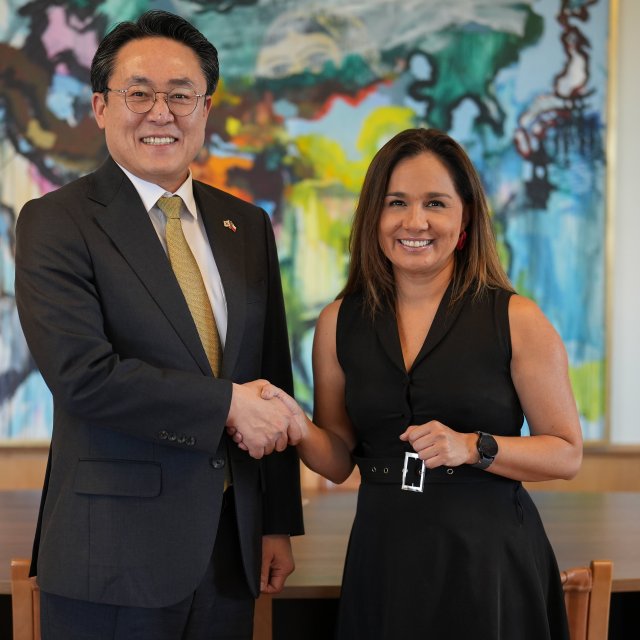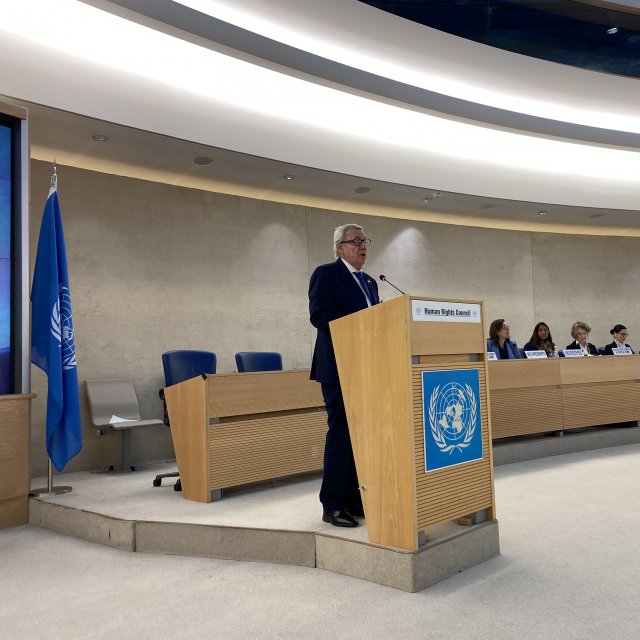 Thursday, February 27th 2025
Undersecretary meets with the Minister of Oceans and Fisheries of the Republic of Korea
Thursday, February 27th 2025
Undersecretary meets with the Minister of Oceans and Fisheries of the Republic of Korea
70 years of Chile in Unesco: Minister Alberto van Klaveren presents strategy for cooperation with the international organization until 2027

The Minister of Foreign Affairs, Alberto van Klaveren, along with the Minister of Education, Marco Antonio Ávila, led the presentation of Chile's Cooperation Strategy with the United Nations Educational, Scientific and Cultural Organization (Unesco) for the period 2023-2027, which was delivered to the regional director of Unesco, Claudia Uribe.
The event was also attended by the Minister of Culture, Arts and Heritage, Jaime de Aguirre; the Minister of Sports, Jaime Pizarro, as well as representatives of various government institutions.
This event takes place in the context of the commemoration of the 70th anniversary of our country's accession to the international organization. In this regard, Minister van Klaveren stressed that "we believe it is important to reaffirm our commitment to continue collaborating closely in the promotion of peace, social justice, sustainable development and intercultural dialogue".
In this sense, he emphasized that the strategy "will allow us to make visible the great work of the United Nations System", in addition to highlighting "the valuable contribution made by (Unesco) in our country, through technical advice and allowing us to compare experiences in order to enrich our public policies and generate international alliances to pursue common objectives".
In this context, he recalled that Chile's participation has had great accomplishments, such as the entry of the Rapa Nui National Park to the list of World Heritage Sites, which gave way, years later, to the churches of Chiloé, the historic center of Valparaíso, the Sewell camp, among others, being considered in this category.
Since 1963, our country has had the Regional Bureau of Education for Latin America and the Caribbean, which has been dedicated to monitoring and providing technical support to countries with a view to advancing the commitment to quality education in the region, and we are part of the organization's Executive Council until 2025.
"These recognitions have helped us to conserve and exalt our material heritage, both in the eyes of Chilean men and women, as well as in the eyes of the rest of the world. But the cultural legacy is not limited to the tangible, so it was with great joy that we received the news at the end of last year when the Chilean pottery of Quinchamalí and Santa Cruz de Cuca was declared Intangible Heritage of Humanity", said the Minister.
Cooperation strategy 2023-2027
The Minister explained that the pillars of this strategy are the multilateral technical and political dialogue to "continue contributing in an active and proactive manner before various regional and international bodies with the purpose of strengthening international law, the defense of human rights and the promotion of international cooperation".
In addition, inter-ministerial coordination will continue to deepen in order to strengthen the work of the State in areas such as education, science, culture, communication and information, as well as identifying alternatives for cooperation in other areas.
Chile became a member of Unesco in 1953 and its participation is mainly rooted in the Ministry of Education, in coordination with various government bodies, including the Permanent Mission of Chile to Unesco, an entity of the Ministry of Foreign Affairs whose mission is to represent our country before the authorities of the organization at its headquarters in Paris.
Related articles
 Thursday, February 27th 2025
Undersecretary meets with the Minister of Oceans and Fisheries of the Republic of Korea
Thursday, February 27th 2025
Undersecretary meets with the Minister of Oceans and Fisheries of the Republic of Korea
 Monday, February 24th 2025
Minister van Klaveren reaffirms Chile's commitment to human rights and gender equality
Monday, February 24th 2025
Minister van Klaveren reaffirms Chile's commitment to human rights and gender equality















